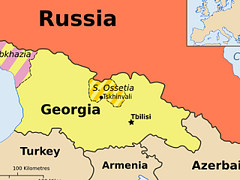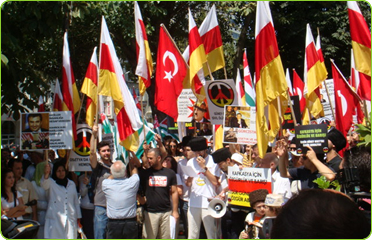After what happened to Crimea in Ukraine, many people have started to wonder what will happen to the three breakaway states of Abkhazia, South Ossetia and Transnistria.
Within Eurasia there are many breakaway states, but their history is not always well known. In a previous article published on GPPW we discussed the dispute surrounding the Nagorno-Karabakh region. This article will focus on Abkhazia and South Ossetia which are two breakaway states of Georgia along with Transnistria, a breakaway region of Moldova.
The four regions mentioned above share a similar history; they are all post-Soviet frozen conflict zones, barely recognized internationally and have experienced Russian military intervention in the past.
Abkhazia and South Ossetia in Georgia

Fig 1: Abkhazia and South Ossetia
As can be seen on the map above both the Republic of Abkhazia and the Republic of South Ossetia share borders with Russia. During the Soviet Union, South Ossetia held an autonomous status within Georgia but after the disintegration of the USSR, Georgia distanced itself from Russia awakening feelings of independence in South Ossetian leaders.
South Ossetia declared independence in 1991 triggering the 1991-1992 war as Georgia tried to regain control of the territory by force. Abkhazia followed suit and declared independence in 1992 leading to another war from 1992-1993.
Georgia tried once again to regain control over South Ossetia by force in 2004, and in 2008 went to war with Russia for five days but failed to annex the region in both instances. After the end of the brief war, it became clear that Abkhazia and South Ossetia would never be part of Georgia again. The citizens of these regions are being protected by Russian military forces, enjoy Russian citizenship and therefore have no desire to be part of Georgia. As mentioned by Foreign Affairs Magazine: “The Russian security services operate freely within these enclaves, and Moscow has awarded Russian citizenship to many of their inhabitants.”
Both regions were only recognized by Moscow as being independent states after the 2008 war.
Transnistria in Moldova

Fig 2: Transnistria
Transnistria, also known as Trans-Dniester declared independence from Moldova in 1990. For two years after declaring its independence Transnistria faced instability in the region with conflict escalating within its territory. This instability led to the War of Transnistria in 1992 between the Moldovan government and Russian separatists which lasted four months. After the war, a demilitarized zone of 10 km was established and enforced by the Russian military who were already present in the region. Kashi asserts that “To date, there are approximately 2,000 Russian troops stationed in Transnistria, who guard huge weapons and ammunition stockpiles.”
People in this region hold Russian citizenship and most of the population are ethnic Russians. Transnistria also relies heavily on Russian troops for protection. Until today the region’s independence has not been recognized internationally, not even by Moscow.
After the Russian annexation of Crimea, concerns in the international community surrounding the future of breakaway regions such as Transnistria started to grow mainly because most of the population is ethnic Russian. After the events in Crimea the Transnistrian government expressed interests in joining the Russian Federation. But will this region have a similar fate as Crimea?
People’s opinion
Below are a series of graphs based on public opinion surveys conducted in the breakaway regions by Gerard Toal, director of the Government & International Affairs program at Virginia Tech University in the US and John O’loughlin, a Professor of Geography at the University of Colorado.
Was the dissolution of the Soviet Union a right or a wrong step?

As illustrated above, most of the population of the breakaway regions believe that leaving the Soviet Union was a step in the wrong direction. It shows that these regions are very pro-Russian.
Do you trust the current Russian leadership?
The graph above shows that citizens of breakaway regions have faith in Russian leadership. They favor the presence of Russian troops within their regions and claim that they can “sleep well in their beds” due to the presence of these troops.
What is your preference for the political future of your entity?
As illustrated above interesting opinions throughout the regions can be seen as some favor independence and others integration with Russia. In Transnistria, becoming part of Russia would be a move welcomed by the population whilst in South Ossetia and Abkhazia the situation would be more complicated. Most people in Abkhazia favor continuing independent while South-Ossetians would seem to prefer joining Russia.
Conclusion
Russian annexation of these regions would be condemned by the international community and be highly opposed by Moldova and Georgia. However Russia might use the years of economic and military support against them to persuade them to join the Russian Federation. It also important to bear in mind that the history of these countries is completely different from Crimea’s. These breakaway regions have been living in isolation for more than 20 years; they have experienced war and violence within their territory and, as seen on the graphs above, not all are willing to give up their hard earned independence.
Cover image ‘South Ossetians & Abkhazians protest for recognition‘ by Blatant World

